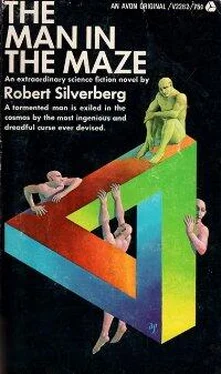“When we reach Earth,” said Boardman crisply, “I’ll put you through a detailed briefing. You’ll come out of it knowing as much about the radio people as we do, which isn’t saying a great deal. After that you’ll be on your own. But I’m sure you’ll realize, Dick, that the hearts and souls of billions of Earthmen will be praying for your success and safety.”
“Who’s being glib now?” Muller asked.
“Is there anyone you’d like me to have waiting for you when we dock Earthside?”
“No.”
“I can send word ahead. There are people who’ve never stopped loving you, Dick. They’ll be there if I ask them.”
Muller said slowly, “I see the strain in your eyes, Charles. You feel the nearness of me, and it’s ripping you apart. You feel it in your gut. In your forehead. Back of your breastbone. Your face is going gray. Your cheeks are sagging. You’ll sit here if it kills you, yes, because that’s your style. But it’s hell for you. If there’s anyone on Earth who never stopped loving me, Charles, the least I can do is spare her from hell. I don’t want to meet anyone. I don’t want to see anyone. I don’t want to talk to anyone.”
“As you wish,” said Boardman. Beads of sweat hung from his bushy brows and dropped to his cheeks. “Perhaps you’ll change your mind when you’re close to Earth.”
“I’ll never be close to Earth again,” Muller said.
He spent three weeks absorbing all that was known of the giant extragalactic beings. At his insistence he did not set foot on Earth during that time, nor was his return from Lemnos made known to the public. They gave him quarters in a bunker on Luna and he lived quietly beneath Copernicus, moving like a robot through steely gray corridors lit by warm glowing torches. They showed him all the cubes. They ran off a variety of reconstructs in every sensory mode. Muller listened. He absorbed. He said very little.
They kept well away from him, as they had on the voyage from Lemnos. Whole days passed in which he saw no human being. When they came to him they remained at a distance of ten meters and more.
He did not object.
The exception was Boardman, who visited him three times a week and made a point always of coming well within the pain range. Muller found that contemptible. Boardman seemed to be patronizing him with this voluntary and wholly unnecessary submission to discomfort. “I wish you’d keep away,” Muller told him on the fifth visit. “We can talk by screen. Or you could stay by the door.”
“I don’t mind the close contact.”
“I do,” said Muller. “Has it ever occurred to you that I’ve begun to find mankind as odious as mankind finds me? The reek of your meaty body, Charles—it goes into my nostrils like a spike. Not just you; all the others too. Sickening. Hideous. Even the look of your faces. The pores. The stupid gaping mouths. The ears. Look at a human ear closely some time, Charles. Have you ever seen anything more repulsive than that pink wrinkled cup? You all disgust me!”
“I’m sorry you feel that way,” Boardman said.
The briefing went on and on. Muller was ready after the first week to undertake his assignment, but no, first they had to feed him all the data in the bank. He absorbed the information with twitchy impatience. A shadow of his old self remained to find it fascinating, a challenge worth accepting. He would go. He would serve as before. He would honor his obligation. At last they said he could depart.
From Luna they took him by iondrive to a point outside the orbit of Mars, where they transferred him to a warp-drive ship already programmed to kick him to the edge of the galaxy. Alone. He would not, on this voyage, have to take care not to distress the crew by his presence. There were several reasons for this, the most important being that the mission was officially considered close to suicidal; and, since a ship could make the voyage without the use of a crew, it would have been rash to risk lives—other than his, of course. But he was a volunteer, Besides, Muller had requested a solo flight.
He did not see Boardman during the five days prior to his departure, nor had he seen Ned Rawlins at all since their return from Lemnos. Muller did not regret the absence of Boardman, but he sometimes wished he could have another hour with Rawlins. There was promise in that boy. Behind all the confusion and the foggy innocence, Muller thought, lay the seeds of manhood.
From the cabin of his small sleek ship he watched the technicians drifting in space, getting ready to sever the transfer line. Then they were returning to their own ship. Now he heard from Boardman, a final message, a Boardman special, inspirational, go forth and do your duty for mankind, et cetera, et cetera. Muller thanked him graciously for his words.
The communications channel was cut.
Moments later Muller entered warp.
The aliens had taken possession of three solar systems on the fringes of the galactic lens, each star having two Earth-settled planets. Muller’s ship was aimed at a greenish-gold star whose worlds had been colonized only forty years before. The fifth planet, dry as iron, belonged to a Central Asian colonization society which was trying to establish a series of pastoral cultures where nomad virtues could be practiced. The sixth, with a more typically Earthlike mixture of climates and environments, was occupied by representatives of half a dozen colonization societies, each on its own continent. The relations between these groups, often intricate and touchy, had ceased to matter within the past twelve months, for both planets now were under control of extragalactic overseers.
Muller emerged from warp twenty light-seconds from the sixth planet. His ship automatically went into an observation orbit, and the scanners began to report. Screens showed him the surface picture; via template overlay he was able to compare the configurations of the outposts below with the pattern as it had been prior to alien conquest. The amplified images were quite interesting. The original settlements appeared on his screen in violet, and the recent extensions in red. Muller observed that about each of the colonies, regardless of its original ground plan, there had sprouted a network of angular streets and jagged avenues. Instinctively he recognized the geometries as alien. There sprang to mind the vivid memory of the maze; and though the patterns here bore no resemblance to those of the maze, they were alike in their lack of recognizable symmetries. He rejected the possibility that the labyrinth of Lemnos had been built long ago by direction of the radio beings. What he saw here was only the similarity of total difference. Aliens built in alien ways.
In orbit, seven thousand kilometers above the sixth planet, was a glistening capsule, slightly longer on one axis than on the other, which had about the mass of a large interstellar transport ship. Muller found a similar capsule in orbit about the fifth world. The overseers.
It was impossible for him to open communications with either of these capsules or with the planets beyond. All channels were blocked. He twisted dials fitfully for more than an hour, ignoring the irritable responses of the ship’s brain which kept telling him to give up the idea. At last he conceded.
He brought his ship close to the nearer orbiting capsule. To his surprise the ship remained under his control. Destructive missiles that had come this close to alien overseers had been commandeered, but he was able to navigate. A hopeful sign? Was he under scan, and was the alien able to distinguish him from a hostile weapon? Or was he being ignored?
At a distance of one million kilometers he matched velocities with the alien satellite and put his ship in a parking orbit around it. He entered his drop-capsule. He ejected himself and slid from his ship into darkness.
Читать дальше












